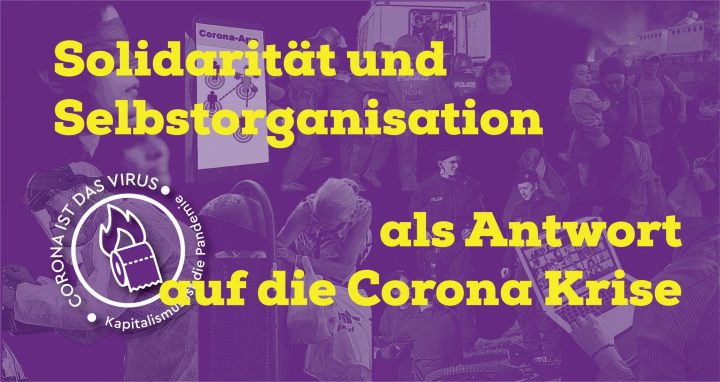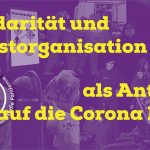Corona ist das Virus – Ausbeutung ist die Pandemie

24.04.2021 ab 14 Uhr auf dem Nettelbeckplatz im Wedding
— ENGLISH BELOW —
Unsicherheit bestimmt unser tägliches Leben in der Krise. Geschäftsschließungen, kein Zusammenkommen in Cafés, keine gemeinsamen Geburtstage. Stattdessen finanzielle, familiäre und berufliche Zukunftsängste. Plötzlich scheint unsere Gesundheit durch soziale Momente gefährdet. Wir sollen uns auf die Einschätzungen von Epidemiolog*innen und das Infektionsschutzgesetz verlassen. Aber die Diskrepanz zwischen dem Verbot im Park ein Bier zu trinken, während wir morgens im vollgestopften ÖPNV ins Büro fahren, lässt an vielen Stellen den Weg hin zur autoritären Bevormundung erahnen.
Es dauerte fast ein Jahr bis kostenlose Schnelltests allgemein zugänglich wurden. Dabei stellte sich heraus, dass zwei Drittel der Corona-Toten in Pflegeheimen gestorben sind. Trotzdem müssen Pflegekräfte weiterhin um Entlastung kämpfen. Es wird klar, dass hinter den Forderungen nach „Solidarität“ einzig und allein die Absicht steht, die Wirtschaft zu retten und nicht, sich um die Menschen zu kümmern.
Auch für Schulen und Kitas gibt es nach einem Jahr der Krise noch keine überzeugenden Lösungen. Als die Schulen geschlossen wurden, wurden die Wohnungen zum Klassenzimmer und Computer zur Eintrittskarte in diese Klassen. Dieser Schritt führte dazu, dass die Qualität der Ausbildung der Schüler*innen viel stärker abhängig von den Fähigkeiten und Ressourcen der Eltern wurde. Zudem wurden die Schwächen bei der digitalen Ausstattung der Schulen offensichtlich.
Andererseits ist schon Ende März 2020 ein Hilfspaket für die deutsche Wirtschaft in Höhe von 1,2 Billionen Euro geschnürt worden. Fast die Hälfte ging in Form von Staatskrediten an Konzerne wie Adidas, ThyssenKrupp, Lufthansa und Tui. Was auf diese Hilfen folgte, waren Ankündigungen von Massenentlassungen im Sommer (Airbus 10.000, Deutsche Bank 18.000, BMW 6.000 Stellen etc.). Der Autokonzern Daimler, der im Corona-Jahr 700 Millionen Euro Staatshilfen für Kurzarbeit kassiert hatte, erhöhte dankend die Dividende seiner Aktionär*innen um fast 50% im Vergleich zum Vorjahr.
Es ist offensichtlich, dass die Krise dafür genutzt wird, den Arbeitsmarkt umzustrukturieren und den nationalen Vorsprung auszubauen. Da bleibt kein Geld für den Ausbau des Gesundheitssystems, das keine börsennotierten Profite abwirft. Die Bundesregierung arbeitet seit dem ersten Tag der Pandemie Hand in Hand mit den Konzernen in einem weltweiten Konkurrenzkampf um niedrigere Löhne und Sozialabbau. Auf diesem Feld der Ausbeutung können selbst die „offenen“ Grenzen, ausschließlich in Bezug auf Saisonarbeiter*innen aus Osteuropa, die der Corona-Pandemie schutzlos ausgeliefert werden, als Gewinn für den Standort Deutschland bejubelt werden. AHA-Regel (Abstand-Hygiene-Alltagsmaske) und Stay-at-home sind nur ein sehr kleiner Ausschnitt einer Krisenbewältigungsstrategie, die nicht den Zusammenbruch des Gesundheitssystems, sondern jenen der Profitraten fürchtet.
Krisen treffen die Menschen am unteren Ende der Arbeitswelt am härtesten, da diese keinen Schutz und keine Ressourcen haben. Und durch diese Krise sind noch mehr Menschen in diese prekäre Lage geraten.
Den Gastronomiesektor hat es besonders stark getroffen. Als Restaurants, Kneipen und Clubs geschlossen wurden, mussten viele Menschen um ihre Lebensgrundlage bangen. In der Gastro und anderswo wurden als erstes migrantisierte Menschen entlassen und diejenigen mit „Mini-Jobs“ oder in irregulären Arbeitsverhältnissen. Viele, die ihre Arbeit verloren haben, sind ausgewichen auf Jobs als Kurierfahrer*innen bei Essens- oder Paketlieferdiensten.
Schon vor Corona haben immer weniger Menschen im Einzelhandel eingekauft und sind auf Online-Portale umgestiegen. Geschäftsschließungen und Kontaktbeschränkungen haben die Zahl der Online-Bestellungen von Waren und Essen noch mal dramatisch ansteigen lassen und damit auch die Arbeitsbelastung für der Kuriere erhöht. Zeitstress, irreguläre Arbeitszeiten und schlechte Bezahlung sind die Norm. Schutz vor Ansteckung, wie Masken und Desinfektionsmittel, oder notwendige Arbeitsmittel, wie Fahrrad oder Handy, werden meist nicht von den Firmen bereitgestellt. Aufgrund befristeter Verträge, Anstellung auf Mini-Job Basis oder Selbstständigkeit gibt es zudem weder Jobsicherheit noch ausreichenden Kündigungsschutz, da Arbeitsschutzgesetze nicht richtig greifen.
Gerade in Berlin profitieren Firmen davon, dass es viele Menschen gibt, die arbeitslos sind oder keinen Zugang zum regulären Arbeitsmarkt haben und denen deshalb nichts anderes übrigbleibt, als unter diesen Bedingungen zu arbeiten.
Home-Office ist die andere Seite der Krise. Den Firmen wird nahegelegt Home-Office zu ermöglichen, um die Gefahr einer Infektion für die Arbeitnehmer*innen zu minimieren. Mit Hygienemaßnahmen im Büro und der Fabrik wird jedoch vehement versucht, diesem Schritt zu entkommen. Andererseits wird dabei auch außer Acht gelassen, dass die Koordinierung der Betreuung der Kinder, Reproduktionsarbeit im Haushalt und die Abgrenzung von Arbeit und Freizeit besonders für Frauen eine zusätzliche Belastung darstellen.
Aufruf zur Kundgebung
Ein weiteres Mal wird klar, dass Krisen von den Bossen und Regierungen gegen die Arbeiter*innen und jene, die in prekären Verhältnissen leben, gewendet werden. Hinter ihrem Fake-Aufruf zu „Solidarität“ versteckt sich das wahre Motto des Kapitalismus: „Ihre Profite, unsere Verluste“.
Wir wollen zusammen kommen und Netzwerke bilden. Über unsere täglichen Probleme reden und uns selbst- und kollektiv organisieren. Widerständig sein und gegen die Ausbeutung kämpfen!
Komm zu unserer Kundgebung mit Tee, Kaffee, einem kleinen Umsonstflohmarkt und offenen Mikrofon. Wegen der Pandemie mit Maske und Abstand.
24.04.2021 ab 14 Uhr auf dem Nettelbeckplatz in Wedding
https://lockdowncapitalism.noblogs.org/aktuelles/
Corona is the virus – exploitation is the pandemic
During the crisis, our daily lifes are determined by uncertainty. There are business closures, there is no coming together in cafes, no birthdays-parties with friends. Instead there is anxiety about the future, financially, professionally and in the family. Suddenly our health seems to be threatened by moments of social interaction. We are supposed to rely on the judgement of epidemiologists and the Infection Protection Act. It is not allowed to drink beer in the park, while we have to get to the office in packed means of public transport in the morning. This discripancy might arouse the suspicion that autoritarian paternalism is on its way.
It took almost a year for free rapid tests to become widely available. Meanwhile it turned out that two-third of Corona deaths occurred in nursing homes. But still, the nursing staff has to fight for better working conditions. It is becoming obvious that the only intention behind the demands for „solidarity“ is to save the economy, not to take care of people.
After a year of crisis, there are still no convincing solutions even for schools and kindergardens. When schools were closed, homes became classrooms and computers became entry tickets to those classes. This measure meant that the quality of education for students became much more dependent on the skills and resources of their parents. In addition, the school’s lack of digital equipment became obvious.
On the other hand, an aid package of 1.2 trillion euros for the German economy had already been put together at the end of March 2020. Almost half the amount was received by to companies such as Adidas, ThyssenKrupp, Lufthansa and Tui in the form of government loans. What followed were announcements of mass layoffs in summer (Airbus 10,000, Deutsche Bank 18,000, BMW 6000 jobs, etc.). The car company Daimler, which had received public aid of 700 million euros to finance short-time work in the Corona year, gratefully increased the dividend of its shareholders by almost 50% compared to the previous year.
It is obvious that the crisis is being used to restructure the labor market and expand national advantages. There is no money left for the support of the health care system, which does not generate profits on the stock exchange. Since the first day of the pandemic, the federal government has been working hand in hand with the corporations that are taking part in a worldwide competition for lower wages and social cuts. In this field of exploitation, even the „open“ borders, that are „open“ exclusively for seasonal workers from Eastern Europe, can be hailed as a gain for Germany as a business location. Keep your distance, wash your hands, wear a mask and stay-at-home are only very small parts of a crisis management strategy that fears not the collapse of the health care system but that of profit rates.
During crises people at the bottom of the economy are hit the hardest because they do neither have protection nor resources. And this crisis has put even more people in this precarious position.
The gastronomy has been hit particularly hard. When restaurants, pubs and clubs closed, many people had to fear for their livelihood. In the service sector and elsewhere, the first to be laid off were migrant people and those who have to make a living with „mini-jobs“ or undeclared work. Many who have lost their jobs have found employment as courier drivers for food or parcel delivery services.
Even before Corona, fewer and fewer people were shopping in retail stores and switching to online platforms. Store closures and contact restrictions have dramatically increased the number of online orders for goods and food. The boom in online shopping has thus also increased the workload for the couriers. Stress, irregular working-hours, unsafe work conditions and poor payment are the norm. Most companies also do not provide protection against infection, such as masks and disinfectant, or the necessary work equipment, such as bikes or cell phones. Due to temporary contracts, employment on a mini-job basis or freelance work, there is also neither job security nor sufficient protection against dismissal, as labor protection laws are not effictive in this line of work.
In Berlin in particular, companies benefit from the fact that there are many people who are unemployed or have no access to the regular labor market and who therefore have no choice but to work under these conditions.
Home office is the other side of the crisis. Companies are encouraged to allow home offices to minimize the risk of infection for workers. However, with measures to improve hygene at the office and factory companies vehemently try to avoid this step. On the other hand, it is also ignored that coordinating childcare, reproductive work in the household and the separation of work and leisure time puts a great deal of pressure, especially, on women.
Call for the rally
Once again it becomes clear that by bosses and governments turn crises against workers and those living in precarious conditions. Behind their fake call for „solidarity“ hides the true motto of capitalism: „their profits, our losses“.
We want to come together and build networks. Talk about our daily problems and organize ourselves collectively. Resist and fight against exploitation!
Come to our rally with tea, coffee, a small free flea market and an open microphone. As there is a pandemic, wear a mask and keep physical distance.
24.04.2021 | 14:00 Nettelbeckplatz in Wedding
https://lockdowncapitalism.noblogs.org/aktuelles/
passiert am 24.04.2021


